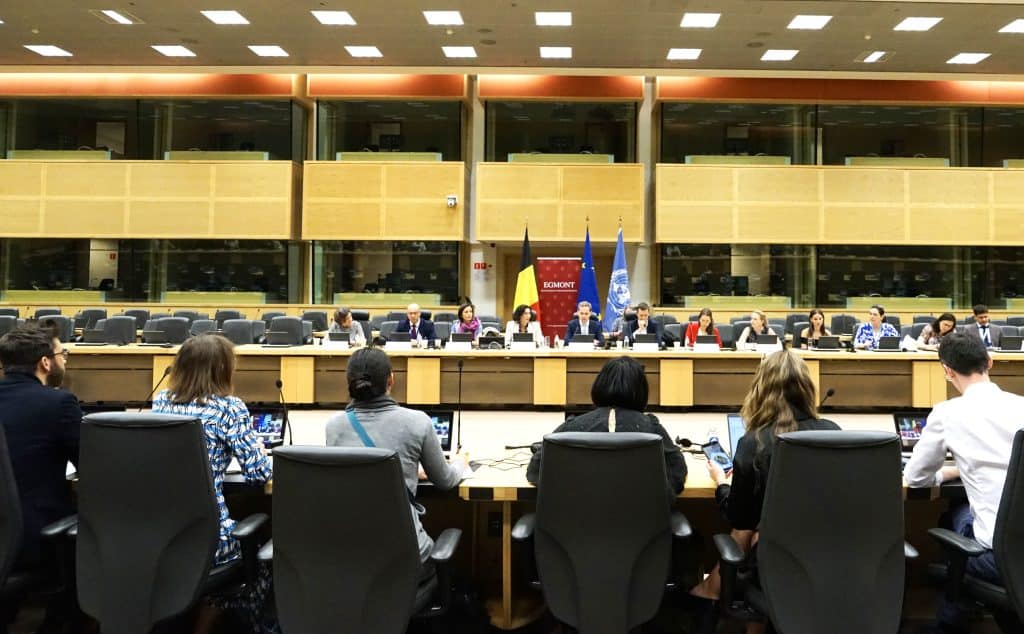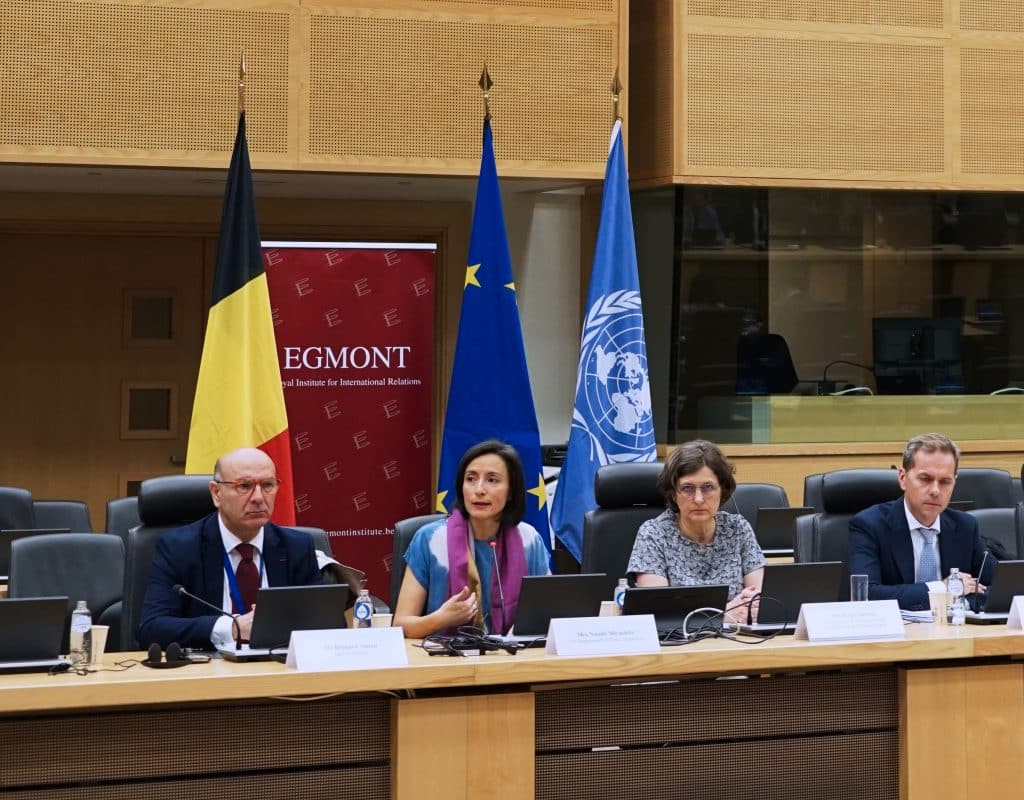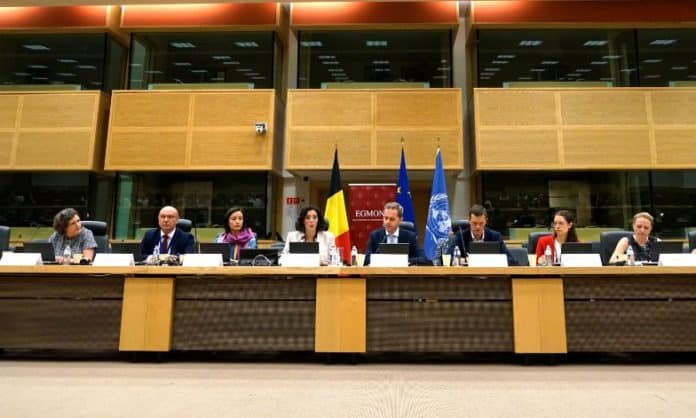“The digital information ecosystem is fertile ground for misinformation, disinformation and hate speech. We see a correlation between online speech and offline harms in peacekeeping settings,” said Ms. Naomi Miyashita, project manager in charge of addressing mis- and disinformation at the UN Department of Peace Operations during a conference on disinformation and peacekeeping in Brussels, Belgium.
The conference to address the challenges posed by misinformation and disinformation to UN peacekeeping missions was organised on the occasion of the 75th anniversary of UN peacekeeping on 29 June 2023.

Since they were created in 1948, no less than 71 peacekeeping operations have been deployed around the world. Currently there are 12 peacekeeping operations active in the field, led by the Department of Peace Operations. Through their 75 years of history, peacekeeping has proven to be a resilient multilateral tool, supporting countries emerge from conflict, build peace, strengthen sovereignty and gain independence, amongst other tasks.
Disinformation (false information intended to cause harm), misinformation (false information not intended to cause harm) and information manipulation or malinformation (information that is truthful but is slanted to misleads and cause potential harm) not only complicate the task of the UN peacekeepers in these missions. They also put their lives in danger while affecting the morale of uniformed and civilian peacekeepers. Underlying causes, including weak media sectors and a lack of media and digital literacy, help misinformation and disinformation to flourish.
Opening the conference, Belgian Foreign Minister Hadja Lahbib said “the global challenge represented by disinformation can only be addressed with the UN and with a global response.”
Digital platforms
The use of social media as a first source of information, especially among young people, is rapidly increasing. Digital platforms are struggling to keep up with the misuse of their platforms to spread disinformation and hate speech to millions of people, fuelling conflict, threatening the work and even the very existence of UN peacekeeping missions.
“Common solutions must be found to counter the spread of fake news, such as social networks taking responsibility,” Lahbib stated.
Against the backdrop of the recent developments in Mali where disinformation accompanied the calls for MINUSMA to leave, the topic becomes an even more burning issue.
Good practices
At the conference, panellists explored different ways to address the issue.
Ms. Miyashita stressed the need for all peacekeepers to be trained, particularly those in leadership positions, to proactively engage with media and encourage two-way communication campaigns and engagement, which “meet local citizens where they are” both online and offline.

With every mission being different, operating in a specific local context where stress levels for peacekeepers vary, it is key to “always adapt your message to different audiences and to include local partners,” agreed Mr Benjamin Mols from the European External Action Service, the European Union’s diplomatic service.
Working locally, including with influencers such as religious leaders, in information campaigns in local languages is an effective approach which is being implemented by the GRIP (Groupe de recherche et d’information sur la paix et la sécurité), a civil society organisation who also trained citizens and local media as fact checkers in local languages.
Mr Bernard Siman from the Egmont Institute advocated for a narrative that is more compelling and emotive in order to mitigate the security threat in the field: conveying messages that the UN brings hope while acknowledging the historical legacy of the mission in the local community.
Another approach that has worked well according to Ms. Miyashita is the use of local and national radio, citing the example of Radio Okapi in the Democratic Republic of Congo. This radio station broadcasts nationwide in the four local languages (Swahili, Lingala, Kikongo and Tshiluba) as well as in French in order to serve the largest public possible in DRC. Dissemination of accurate, verified information in local languages, ensures citizens have direct access to the correct information in a language they understand.
She added that not all negative sentiment was manipulated messaging; legitimate and genuine criticism of the United Nations needed to be reckoned with.
Complex response
In her closing remarks Birgit Stevens, UN Director at the Belgian Foreign Ministry, recognised the complexity of the issue of misinformation, disinformation and malinformation and its links with peacekeeping.
Given the impact on both the population and on the peacekeepers, practices happening offline and online, the role of local languages, etc. “the response also has to be complex, and not only reactive but also proactive” she concluded.
The UN system is currently developing a response in the digital space, in the form of a Code of Conduct for information integrity on digital platforms aimed at governments, tech companies, digital platforms, advertisers and other stakeholders, to make the online world safer and more inclusive, while vigorously protecting human rights.
The conference was organised by the Belgian Ministry of Foreign Affairs, Foreign Trade and Development Cooperation, in collaboration with the Belgian Ministry of Defense, the Egmont Institute, the UN Regional Information Centre and the UN Liaison Office for Peace and Security in Brussels.
Speakers at the panel included Ms Naomi MIYASHITA, UN Department of Peace Operations, Mr Benjamin MOLS, European External Action Service, Mr Bernard SIMAN, Egmont Institute, Ms Clémence BUCHET-COUZY, Groupe de Recherche et d’Information sur la Paix et la Sécurité
Useful links:
- United Nations: Countering disinformation
- UN Action for Peacekeeping and Action for Peacekeeping plus (A4P+)
- Taking the UN-EU strategic partnership on peace operations and crisis management to the next level: priorities 2022-2024




